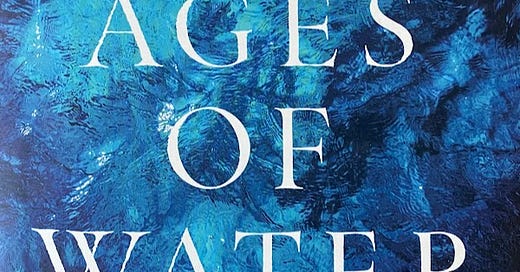Book Review: The Three Ages of Water
I’m always seeking to learn more about water, the vital role it plays on our planet and our relationship with it. In his latest book, The Three Ages of Water, Dr. Peter Gleick1 presents the complex history of the role that water has played in the evolution of our species and the agricultural, industrial and technological revolutions.
Gleick describes three ages of water on our planet. In the First Age of Water, the author describes the role of water in the evolution of Homo sapiens, from the earliest evidence of our species. The estimated population was on the order of a few million as humans evolved and migrated through Africa and into Asia, Europe and farther. Water was taken from rivers and springs while disposal of human waste into the same water typically wasn’t an issue because of the low population.
The Second Age of Water includes more-recent times (Gleick states that we are all children of the Second Age of Water). Along with the growth of population, humans found ways to build and grow cities where water was scarce by learning how to alter the water cycle. During this period, humans made tremendous advances in the areas of industry, agriculture and technology. These advances, however, have resulted in water issues that we continue to deal with today, such as: contamination of water supplies by industrial chemicals or human waste (among other things), and depleting water resources.
Gleick proposes an optimistic Third Age of Water. This stage begins in our current critical state due to the impacts we’ve had on our planet. We have a better understanding of the value of water and we’re paying better attention to managing water as cities grow. There’s obviously still a lot of work to do, but we have technologies to clean and re-use water.
For those of us who live in water-rich areas, it’s easy to forget how valuable water is. In his book, Gleick provides a historical account of water issues that go back hundreds, even thousands, of years up to today. Empires went to war over water. Countless lives have been lost because of water-borne bacteria. Rivers have run dry from overuse. Over-pumping groundwater has resulted in land subsidence. We’re still dealing with many of these issues (for example, see previous articles from the Water Droplet: The Walkerton tragedy in Ontario, water issues in the Colorado River, land subsidence).
Many of the water issues from the Second Age of Water occurred because we didn’t know any better. In the Third Age, we can no longer use ignorance as an excuse. I like Gleick’s optimism about building a better water future and I believe one of the key steps is education. We need to continue to spread the word about the importance of water and we all need to understand our role in the water cycle.
I found this book very informative and engaging. Even with my three-plus decades working in the groundwater profession, I learned a lot. Gleick, a scientist, has found a way to write a science book without a lot of technical jargon. This makes the book accessible to a wide-range of readers, not just those of us who work world of water. I highly recommend The Three Ages of Water!
Thanks for reading The Water Droplet and keep watching for more stories about water!
From his website: Dr. Peter Gleick is a leading scientist, innovator, and communicator on global water and climate issues. He co-founded the Pacific Institute in Oakland, one of the most innovative, independent non-governmental organizations addressing the connections between the environment and global sustainability. Dr. Gleick’s work has redefined water from the realm of engineers to the world of sustainability, human rights, and integrated thinking. Gleick pioneered the concept of the “soft path for water,” developed the idea of “peak water,” and has written about the need for a “local water movement.” Among many other honors, Gleick received the prestigious MacArthur “genius” Fellowship, the U.S. Water Prize, and has been named “a visionary on the environment” by the BBC. He was elected in 2006 to the U.S. National Academy of Sciences. In 2018 he was awarded the Carl Sagan Prize for Science Popularization. In 2023 he was elected to the American Academy of Arts and Sciences.
Gleick is the author/editor of many scientific papers and books, including The World's Water series, Bottled and Sold: The Story Behind Our Obsession with Bottled Water (Island Press, Washington), A 21st Century U.S. Water Policy (Oxford University Press, New York), and most recently, the new book The Three Ages of Water (PublicAffairs/Hachette 2023).




